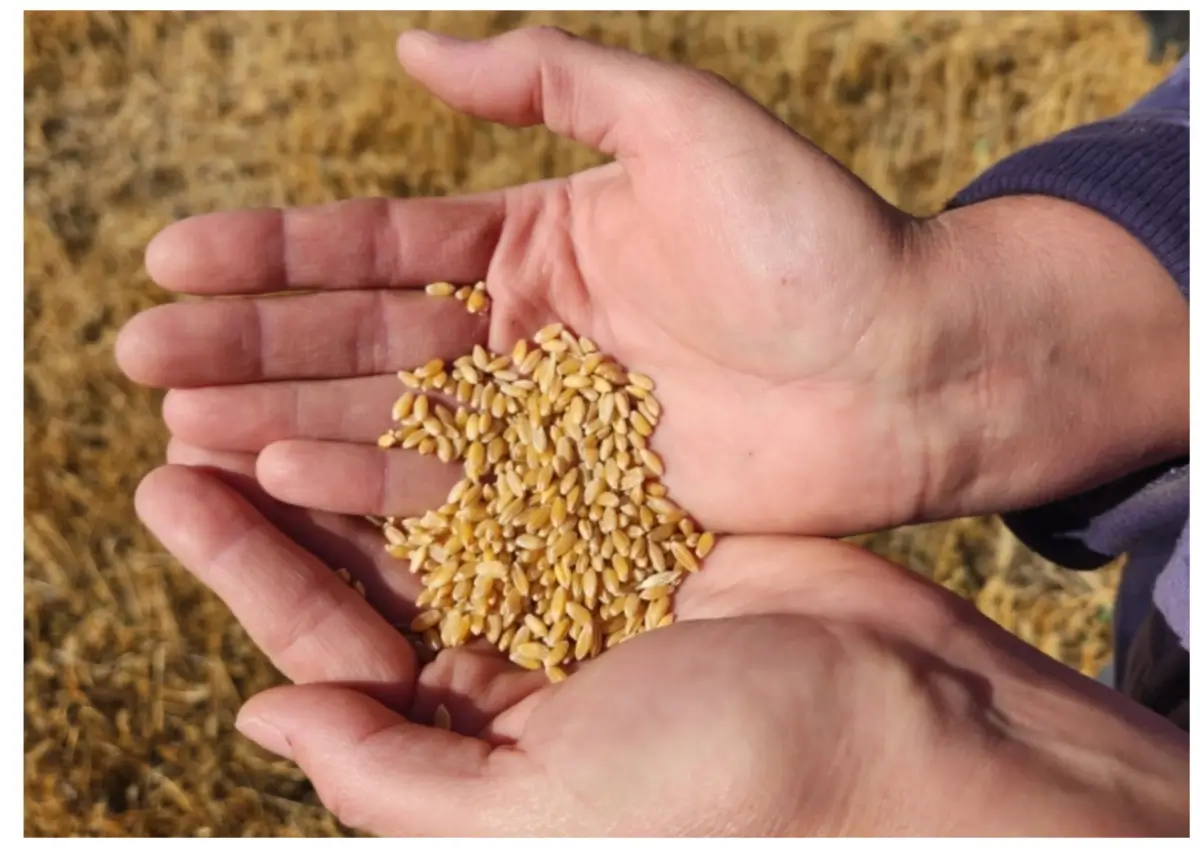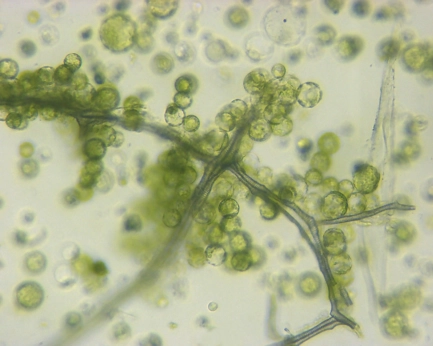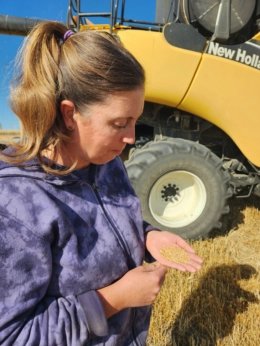In Canada, organic advocates are voicing opposition to government policies that don’t distinguish gene-edited seeds and crops as genetically modified.

In traditional plant breeding, the pollen of one plant is added to the pollen of another to create a new and better progeny. It mimics the natural process of bees, insects and other pollinators transferring pollen between plants as they gather food and nectar.
Genetically modified crops (GMO) are also cross-bred, but instead of pollen, foreign DNA is introduced into the plant’s genome to create a new crop with desired characteristics such as sweeter-tasting fruit or longer-lasting color.
But genome-edited (GE) breeding falls somewhere in the middle, depending on how you look at it. Ian Affleck is vice president of biotechnology for CropLife Canada, a trade association representing developers and distributors of plant science innovations and plant biotechnology. He describes GE crops as naturally derived, because you’re not introducing anything new into the genome. “The GE process is like tweaking a Word document. Instead of importing data, you are simply copying and pasting within the original document, using the material that has already been written.”
In this metaphor, the seed, or document, had no bugs or glitches before moving things around internally, so, it shouldn’t have any after the treatment, as nothing new has been added.The process, better known by some as CRISPR, is highly controversial among proponents of organic growing.
Allison Squires is an organic farmer and president of Canadian Organic Growers. “It’s still not natural. The seed has been synthetically altered.” Now, regulations from the Canadian government this spring have put Squires in what she sees as a precarious situation.

CRISPR editing of seeds. Photography by Shutterstock.
In May, the Canadian federal government introduced new guidelines that removed public disclosure requirements and reduced health and safety assessments on some GE seeds. In the new wording of the regulation, two types of plants fall under an automatic assessment from the Canadian Food Inspection Agency (CFIA). All seeds that introduce DNA from another species (meaning all GMO seeds) trigger an automatic assessment from CFIA. Plus, plants that possess “new traits and have the potential to negatively impact the environment” require assessment. Some GE seeds may fall under that second umbrella, and others will not.
The bulk of Squire’s grain is exported to the European Union (EU), where any plant that has had its DNA altered in any way that doesn’t occur naturally is classed as a GMO. This includes GE-derived products. “It’s a huge market,” she says. Every load Squires sends overseas is genetically tested two or three times by EU customs, and agricultural officials have to make sure it’s not been in any way genetically manipulated, before being allowed into commercial circulation. “It’s a stringent process,” she says. “If my grain is deemed to be synthetically altered, I not only will lose the income from the shipment but will not be able to sell to the EU for several years until I can prove myself again.”
The issue, for Squires and other growers like her, is that GE seeds can be released in the Canadian market without any additional testing—and growers are not obligated to disclose that the seeds have been gene edited.
When Squires buys seed from a distributor, they sign an affidavit assuring her that what she buys hasn’t been genetically altered. In Canada, under the Canadian Organic Standards, farmers are required to disclose if they use gene-edited seed or feed for livestock. If they do, even by mistake, they lose their organic certification. However, it is possible that because GE seeds won’t be identified as genetically altered within Canada that neither she nor the seed distributor will know if she is being sold GE seed.
Proponents of gene-edited products point to Seeds Canada as the answer to everyone’s woes. The advocacy group has developed the Canadian Variety Transparency Database as a way for growers such as Squires to keep track of GE seeds as they enter the marketplace.

Alison Squires at her farm, Upland Organics. Photography courtesy of Upland Organics.
Lucy Sharratt is a coordinator for the Canadian Biotechnology Action Network (CBAN) and works with farmer associations and environmental and social justice groups opposed to the synthetic engineering of food. She isn’t convinced the database will be effective when it comes to GE seed. “It’s entirely voluntary; seed companies can choose to register their seeds or not. There’s no tracking of who has or hasn’t [registered] and no enforcement. ”
Sharratt also points out that this lack of disclosure could translate to the consumer. In most Canadian grocery stores, organic and non-organic produce is clearly labeled. However, if GE seed is not required to be disclosed, it only follows that what is grown from that seed won’t be either. Consumers are already leery of this, according to a 2022 public opinion poll conducted by CBAN. A majority of Canadians (54 percent) are concerned about the safety of genetically altered foods and opposed by nearly two to one to letting companies conduct their own safety assessments, rather than the federally regulated Health Canada.
In the United States, there’s also opposition to government policy surrounding GE products. In 2020, the Plant Protection Act removed requirements regarding public disclosure and safety assessments on GE seed.
The Organic Trade Association (OTA) represents 10,000 organic businesses across 50 states and, as in Canada, continues to advocate for the organic food system to remain true to its intent by keeping modern biotechnology out—including GE seed.
Currently, there are only a handful of GE vegetables and a soybean variety available commercially in the US. “In Canada, a few vegetable seeds could enter the marketplace in time for the 2024 growing season, with grain following a couple of years later,” Affleck predicts.
And despite media reports that the Canadian decision was influenced by biotech companies such as CropLife lobbying the government, there is currently no review process of the legislation scheduled. Affleck maintains the decision “was based on reviews by Health Canada and the Canadian Food Inspection Agency, and all available science.”
This is not reassuring to Squires, who, in a September press release from Canadian Organic Growers, writes that “mandatory transparency of GE seeds is one of the most significant issues organic farmers are facing today. Without it, the integrity of organic production in Canada is severely threatened.”
Personally, all Squires wants, she says, is for GE seeds to be identified and to be able to protect her family’s livelihood. “I don’t care if folk use GE seed, I just want to know, so I have a choice not to.”
A previous version of this article incorrectly stated that all GE seeds were exempt from assessment under Canadian regulations. In fact, some GE seeds may require additional scrutiny from CFIA. We’ve updated the story to reflect this change. We regret the error.
In Edinburgh, UK, Bill Gates is injecting cattle with mRNA gene technology vaccines and is advocating that the meat can be classed as organic. Mr Gates is also, in USA, making fake salt with mRNA additives. I agree with Squires, I want to be given the option of buying organic and it truly being organic!
Selection much less predictable, but people in panic over GMO, so they should be fooled not to suffer by “nocebo effect”. Life goes on and it’s impossible to stop innovations without a harm.
Read https://www.nytimes.com/2015/04/25/opinion/sunday/how-i-got-converted-to-gmo-food.html
and
https://geneticliteracyproject.org/2023/11/27/viewpoint-we-need-to-fend-off-the-sophistry-and-mendacity-of-anti-innovation-anti-biotechnology-activists-science-must-be-evaluated-in-the-light-of-tradeoffs
GMO is GMO and not “GE” Why are you adopting Frankenstein lingo?
The corruption in Canada is beyond scale as Government and industry manipulate anything they can to funnel money to the elite investors. “All available science”? Health Canada don’t even have laboratories and scientist working in this field are mostly not independent industry shills.
We will try to stopp Canadian Organic products coming into Europe until Canadians have dealt with this issue and can clearly identify Organic Produkts including seeds.